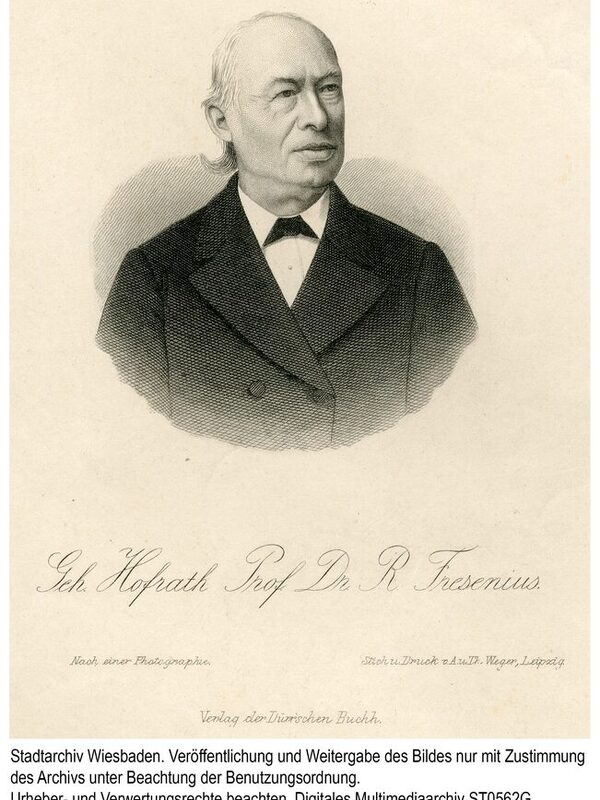Fresenius, Carl Remigius
Fresenius, Carl Remigius
Chemist
Born: 28.12.1818 in Frankfurt am Main
died: 11.06.1897 in Wiesbaden
Fresenius, son of the Frankfurt lawyer Dr. Jakob Samuel Heinrich Fresenius, began an apprenticeship as a pharmacist in 1836 and attended lectures on chemistry and physics at the Senckenberg Institute in Frankfurt am Main. From 1840, he studied natural sciences in Bonn and moved to Giessen a year later to continue his studies at Justus von Liebig's Chemical-Pharmaceutical Institute. He qualified as a professor on June 23, 1843 and moved to Wiesbaden in September 1845, where he became Professor of Chemistry, Physics and Technology at the Ducal Nassau Institute of Agriculture.
In 1848 he set up a chemical institute, where pharmacy was also taught from 1862(Fresenius Chemical Laboratory). In 1868, he expanded his institute to include an agrochemical and oenological experimental station, which was continued by his eldest son Remigius Heinrich Fresenius from 1881. Fresenius developed his institute into a versatile scientific college and a research institute specializing in qualitative and quantitative analytical chemistry.
He had already written the fundamental work "Anleitung zur qualitativen Analyse" in his second semester. This was followed in 1846 by the work "Anleitung zur quantitativen Analyse". Both publications were translated into many languages and continued in numerous new editions. His specialist articles were first published in the "Annalen der Chemie", and from 1862 in the Zeitschrift für Analytische Chemie, which he edited and which later became the "Fresenius' Journal of Analytical Chemistry". The investigations of mineral waters, which are still well-known today, are representative of his diverse chemical investigations.
From 1846, Fresenius was involved in the "Verein für Naturkunde im Herzogthum Nassau" (Association for Natural History in the Duchy of Nassau). He was appointed to its board in 1861 and served as director for ten years from 1864.
Fresenius held numerous offices in public life. Among other things, he was a member of the Nassau municipal parliament for the administrative district of Wiesbaden and the provincial parliament for the province of Hesse-Nassau, chairman of the Wiesbaden city council and a member of the German Protestant Association.
Fresenius was an honorary citizen of the city of Wiesbaden (1892); the Prussian state government awarded him the Grand Gold Medal for Art and Science. Fresenius was buried in the Old Cemetery. Since 1961, the Society of German Chemists has awarded the "Fresenius Prize" named after him. In Wiesbaden, a street and a monument in Dambachtal(Remigius Fresenius Monument) commemorate the chemist.
Literature
Czysz, Walter: 140 Jahre Chemisches Laboratorium Fresenius Wiesbaden 1848-1988. Special print from the yearbook vol. 110 of the Nassauischer Verein für Naturkunde 1988/89, Wiesbaden 1992 [pp. 35-109].
Fresenius, Heinrich: In memory of Remigius Fresenius, 1898.
Pagenstecher, Arnold: Necrology C. Remigius Fresenius. In : Jahrbuch des Nassauischen Vereins für Naturkunde, vol. 50, 1897 [pp. XXIX-XXXIII].
